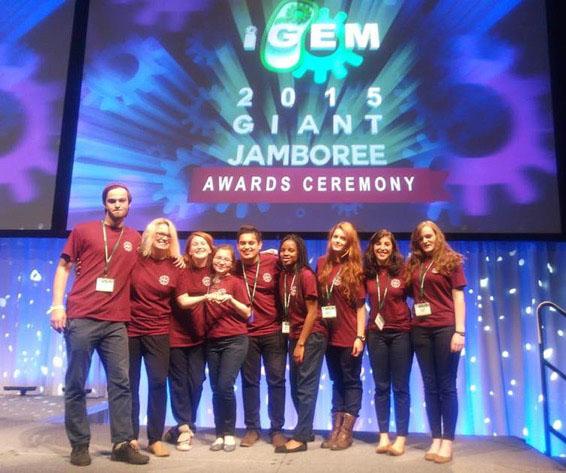Winning ideas from synthetic biology
by Jon Marles-Wright, Chancellor's Fellow, School of Biological Sciences
A summer spent toiling at the lab bench and interviewing policy experts has paid off for Edinburgh's latest iGEM (international Genetically Engineered Machines competition) student team. The 'Class-A-FIED' team brought home a gold medal and trophy following their success at the iGEM Giant Jamboree in Boston in September 2015. The team presented their cell-free drug contaminant biosensor at this event, which is the final of the iGEM competition.

The interdisciplinary team was made up of students from the Schools of Biological Sciences, Chemistry, Informatics and Philosophy. They were aided over the summer by an EastBio PhD student who was undertaking a professional internship as part of this Doctoral Training Partnership. My colleague Louise Horsfall and I provided academic guidance.
The team's thorough and sensitive approach to the controversial subject of harm reduction for recreational drug use impressed the judges in Boston and the team were nominated for the ‘Best Health and Medicine Project’ and ‘Best Integrated Human Practices’ awards in the undergraduate track of the competition. I wasn’t able to go to Boston with the team, so I was watching the final presentations via twitter on my bus ride home. It was an emotional commute! When the judges announced the award winners I let out a cheer from my seat as the team won the ‘Human Practices’ award. This was a fantastic result for the team and in Louise's words: ‘We are overwhelmingly proud of the team’.
This is the latest in a long line of iGEM teams at Edinburgh. The competition offers a great opportunity for students to get together in interdisciplinary groups to work on a real research problem. We’re already preparing for iGEM 2016. We run an iGEM 'Sandpit' during the University’s Innovative Learning Week. This involves a week-long exploration of synthetic biology and a workshop for the development of a project for the University's next entry into the iGEM competition. Over the five days this year we had 30-50 students brainstorming project ideas and thinking about the science and engineering challenges needed to implement them. We also encouraged them to think about how their ideas would work in wider society if implemented. Faculty members from across the university gave short talks on their areas of interest and provided a sounding board for the students. On the Friday we held a mini-biohackathon where members of the 2015 iGEM team encouraged the participants to explore software and technology to support the implementation of their projects. Teams presented their project ideas and all the participants voted for their best project idea, with the winning project to be developed into the iGEM project over the summer.
Our iGEM entry, and the exceptional learning experience this offers our students, couldn't happen without the time an enthusiasm of colleagues from across the University who contribute expertise in science, engineering, medical and social science aspects of the projects. I'd like to thank co-lead Louise Horsfall and all of our team Instructors and Advisors who volunteered their time, lab space and resources over the summer: Dave Clarke, Elliott Chapman, Chris French, Alistair Elfick, Jane Calvert, Baojun Wang, Valentin Zulkower, Fatai Bello and Laura Tuck. None of this would have been possible without the generous sponsorship we received from the Schools of Biological Sciences and Chemistry, SULSA, the MSD fund, BBSRC, Microbiology Society, Society for Applied Microbiology, the Biochemical Society, IDT, Amazon, JP Morgan, and Blackwell’s Bookshop.

